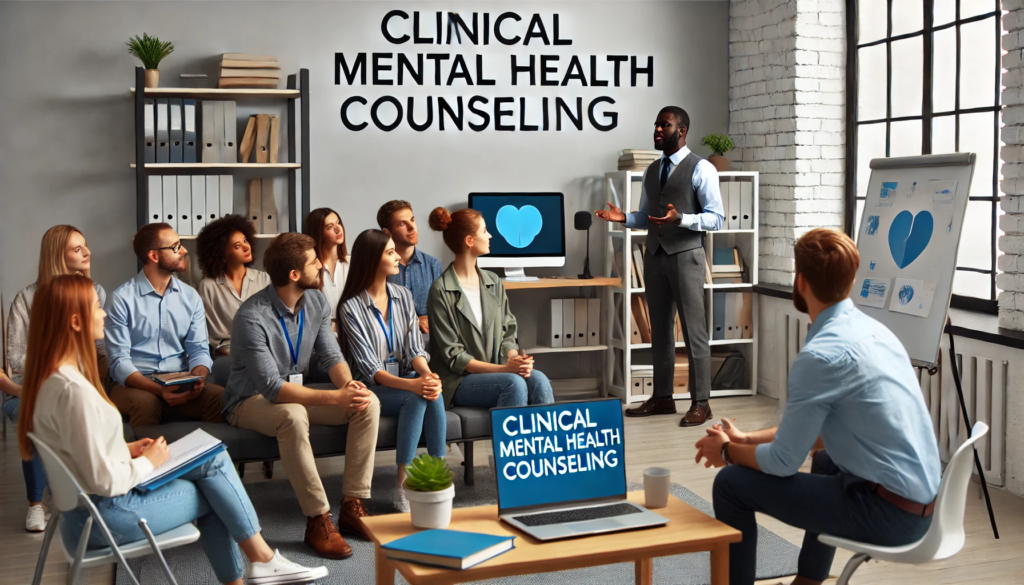Mental health care is in demand now more than ever. As society becomes more aware of mental health challenges, the need for trained professionals grows. If you’re passionate about helping others and considering a fulfilling, people-focused career, you might be wondering how to start a career in therapy with a Masters in Clinical Mental Health Counseling. This guide explains what the degree involves, what you can do with it, and how to start strong in this growing field.
also read: https://babessproduct.com/obgyn-recommendations-for-a-healthy-pregnancy/
What is Clinical Mental Health Counseling?
Clinical Mental Health Counseling is a professional field focused on assessing, diagnosing, and treating emotional, psychological, and behavioral issues. Mental health counselors work with individuals, couples, families, and groups to support mental well-being and help clients navigate life’s challenges.

This work is grounded in evidence-based practices, empathy, and a deep understanding of human behavior. Counselors may help clients manage anxiety, depression, trauma, grief, substance use, and more. This profession isn’t just about listening; it’s about helping clients develop coping strategies and creating a safe space for growth.
Why a Master’s Degree is Essential for a Therapy Career
To legally practice as a clinical mental health counselor or therapist in the U.S., a master’s degree is usually the minimum requirement. Undergraduate degrees in psychology or social sciences can help you build a foundation, but a Master of Science (MS) or Master of Arts (MA) in Clinical Mental Health Counseling provides the clinical training and supervised experience needed for licensure.
Key Components of a Master’s Program
Most accredited programs include:
- Core coursework in areas like counseling theories, psychopathology, ethics, human development, and research methods.
- Practicum and internship placements, where students work under supervision in real counseling settings.
- Licensure preparation, including prep for the National Counselor Examination (NCE) or other state-specific exams.
Steps to Start a Career in Therapy with a Masters in Clinical Mental Health Counseling
Getting into the field of therapy involves multiple steps, each crucial to building your competency and credibility as a counselor.
Step 1: Earn a Relevant Bachelor’s Degree
Start with a bachelor’s degree in psychology, sociology, social work, or a related field. While it’s possible to come from another academic background, relevant undergraduate coursework helps with admission to a graduate counseling program.
Step 2: Apply to Accredited Master’s Programs
Look for programs accredited by CACREP (Council for Accreditation of Counseling and Related Educational Programs). Accreditation ensures that the program meets industry standards and prepares you for licensure.
Step 3: Complete Graduate Coursework and Clinical Hours
Your master’s program typically takes two to three years. During this time, you’ll complete academic work and gain supervised clinical experience. Practicum and internship placements are essential for hands-on learning.
Step 4: Pass the Licensing Exam
After earning your degree, you’ll need to pass a national or state licensure exam. The most common is the NCE. Some states may also require the NCMHCE (National Clinical Mental Health Counseling Examination).
Step 5: Apply for State Licensure
Licensure requirements vary by state, but typically include:
- Completion of a master’s degree
- Supervised clinical hours (often 2,000 to 3,000 post-degree hours)
- Passing the licensing exam
- Background check and application fees
Step 6: Begin Practicing as a Licensed Professional Counselor (LPC)
Once licensed, you’re legally authorized to provide therapy and mental health counseling services. You may work in private practice, community health centers, hospitals, schools, or corporate settings.
Career Opportunities After a Master’s in Clinical Mental Health Counseling

A Master’s in Clinical Mental Health Counseling opens doors to a wide range of careers in mental health care and beyond. Here are some of the most common job titles:
| Job Title | Work Setting | Average Salary (U.S.) |
|---|---|---|
| Licensed Professional Counselor (LPC) | Private practice, clinics, schools | $55,000–$75,000 |
| Mental Health Therapist | Hospitals, treatment centers | $50,000–$70,000 |
| Substance Abuse Counselor | Rehab facilities, nonprofits | $48,000–$65,000 |
| Behavioral Health Counselor | Community health centers | $52,000–$68,000 |
| Clinical Case Manager | Social service agencies | $45,000–$60,000 |
Work Environments
Therapists with this degree can work in:
- Private practices
- Public health departments
- Schools and universities
- Nonprofit organizations
- Military and veteran support services
The field is flexible, allowing for part-time or full-time work, telehealth opportunities, and specialization in areas like trauma, addiction, or family therapy.
Advantages of Starting a Therapy Career with This Degree
1. High Job Demand
The U.S. Bureau of Labor Statistics projects a 18% growth in jobs for mental health counselors from 2022 to 2032 — much faster than average.
2. Emotional and Professional Fulfillment
Helping people cope and grow is meaningful work. Many counselors find deep personal satisfaction in their role.
3. Diverse Specialization Options
You can specialize in areas that match your interests — trauma counseling, marriage and family therapy, substance abuse, or child and adolescent therapy.
4. Potential for Private Practice
After gaining enough experience and full licensure, many therapists open their own practices. This offers flexibility and financial autonomy.
Is a Career in Therapy Right for You?
Not everyone is suited for this kind of work. It demands patience, empathy, emotional intelligence, and strong communication skills. You should also be prepared for emotional fatigue and ongoing learning. However, if you’re driven by a genuine desire to help others heal and grow, it can be one of the most rewarding careers out there.
FAQs About Starting a Career in Therapy with a Masters in Clinical Mental Health Counseling
1. How long does it take to complete a master’s in clinical mental health counseling?
Most programs take 2 to 3 years to complete, including coursework and clinical hours.
2. Can I study online and still become licensed?
Yes, many CACREP-accredited programs are offered online. Just ensure they include in-person clinical placements.
3. What is the difference between a counselor and a therapist?
The terms are often used interchangeably, but licensing and job duties can vary slightly depending on the state.
4. Do I need to get a PhD to become a therapist?
No, a master’s is enough for licensure as a mental health counselor or therapist. A PhD is more common for research or academic roles.
5. How much can I expect to earn after graduation?
Starting salaries typically range from $45,000 to $60,000, with potential to earn more over time or in private practice.
6. What’s the best state to work in as a licensed counselor?
States like California, New York, and Massachusetts offer higher salaries, though cost of living is also higher.
7. Is this degree transferable between states?
Licensure requirements vary, but most states offer reciprocity or streamlined processes if you move.
8. What kind of supervision do I need post-graduation?
Most states require 2,000 to 3,000 hours of supervised clinical experience before granting full licensure.
9. Can I work in schools with this degree?
Yes, though you may need additional certification to become a school counselor in some states.
10. How is this different from a degree in social work?
A Clinical Mental Health Counseling degree focuses more on mental health diagnosis and treatment, while social work includes broader social advocacy and case management skills.
Conclusion
If you’re ready to start a career in therapy with a Masters in Clinical Mental Health Counseling, you’re entering a field that’s both meaningful and in high demand. This degree equips you with the tools to make a real difference in people’s lives. From rigorous academic training to supervised clinical work, the journey is demanding—but worth it. Whether you see yourself in private practice, schools, or community health, the path starts with the right education and a strong sense of purpose.
also read: https://babessproduct.com/hormone-replacement-therapy-myths-vs-facts/
also read: https://babessproduct.com/crowns-vs-veneers-which-option-is-right-for-you/
also read: https://babessproduct.com/empower-your-well-being-navigating-information-about-mental-health/

